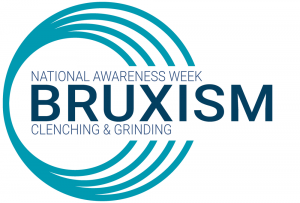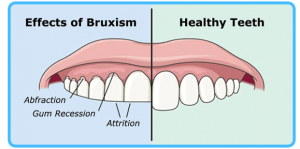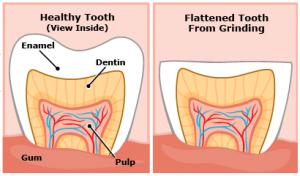This week it is Bruxism awareness week. So I thought that I would create a Blog informing people just what Bruxism is exactly, what it can cause and who is likely to be at risk. There is a lot of information out there so I will try to summarise the key points that I have found.
What is Bruxism?
Is a condition in which you grind, gnash or clench your teeth, this can cause tooth breakage and disorders of the jaw and lead to headaches.
You may be doing this unconsciously by clenching your teeth when you’re awake (awake bruxism) or clenching or grinding them during sleep (sleep bruxism)
Bruxism occurs in both children and adults but is most common in 25-44 year olds. However, most people grind and/or clench their teeth occasionally to a certain degree.
Sleep bruxism is considered a sleep-related movement disorder. People who clench or grind their teeth during sleep are more likely to have other sleep disorders, such as snoring and pauses in breathing (sleep apnea). Your partner will probably notice this before you do.
Mild bruxism may not require treatment. However, in some people, bruxism can be frequent and severe enough to need intervention.
If you have sleep bruxism, you may be completely unaware of it until complications develop, it’s important to know the signs and symptoms.
Signs and symptoms
- Teeth grinding or clenching, the sound of this especially during sleep may be loud enough to wake your partner.
- Teeth appear flattened, have multiple fractures and chips or become loose through gum recession
- Worn tooth enamel, exposing deeper layers of your tooth. Attrition and abfraction
- Increased tooth pain or sensitivity.
- Jaw muscles may feel tight or tired or even painful at times. Could cause antagonial notches in the mandible.
- Locked jaw that does not open and close completely,
- Neck and facial pain and soreness
- Earache like pain, however not caused by anything inside the ear but referred pain from the mouth
- Dull headache radiating from the temples.
- Cheek damage on the sides of the mouth, from chewing, your tongue may also show signs of bite marks.
- Sleep disruption
Below is a visual representation of just how much tooth wear can occur.
Risks factors that increase bruxism
- Stress- We all experience this, when we are feeling anxious, angry, frustrated and stressed this can lead to teeth grinding.
- Personality – Some personality types that are more hyperactive, aggressive or competitive can increase the risk of bruxism. Those will attention deficit hyperactivity disorder can be more prone.
- Medications and other substances- Can be a side effect of some medications such as antidepressants. Alcohol, caffeine and smoking tobacco and the use of recreational drugs can increase the risk of bruxism.
- Genetics – Sleep bruxism is common within families.
- Medical disorders- Some mental health and medical disorders can be associated with bruxism. For example: Parkinson’s disease, dementia, gastroesphageal reflux, epilepsy and night terrors.
- Sleep Disorders – Such as Sleep apnoea.
Long term Implications
- In the long term this can lead to damage to your teeth, restorations, or jaw.
- Tension headaches
- Facial or jaw pain
- Temporomandibular joint dysfunction , this may sound like clicking when you open and close your mouth
What can be done? What treatments are there? And how can you reduce the risks?
Firstly you should attend the dentist regularly to monitor and diagnose any problems that you may be experiencing.
If you grind they may recommend you to wear a mouth guard or a splint at night.This will ease the pressure across your jaw and create a barrier between your teeth to reduce further damage.Mouth guards are custom moulded to your mouth and are usually made of a thin plastic.Mouth splints are similar but made from a harder plastic and tend to be more hard wearing and last longer.
If you think you are grinding and clenching due to stress you may want to try a variety of ways to keep calm and unwind before bed. For example yoga, deep breathing, meditation. Cognitive behaviour therapy may be the answer.
Lifestyle changes will be needed such as reducing alcohol consumption and for smokers , it may be time to try to kick the habit.
The NHS choices website also suggests that you could try habit reversal techniques and record how often you grind or clench and when. Then with this information you can try to train yourself to relax the jaw however this may not be very successful for those who grind at night and there is no scientific evidence that this will cure Bruxism. There are self help books, or hypnosis may be worth exploring.
There is a plethora of help and advice out there and if you are experiencing anything like the symptoms above then mention this to your Dentist or GP and get them to offer you professional advice. It may not lead to long term health implications in every case but it is definitely something to be aware of. We all experience stress in our life and it really is a common problem among patients.


